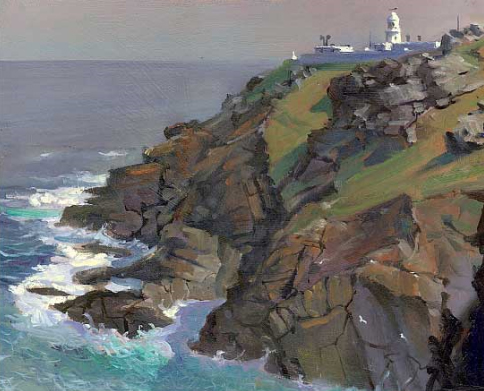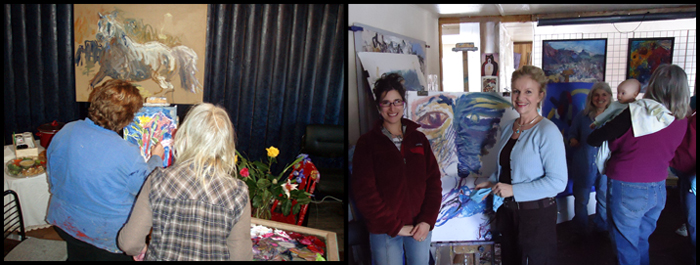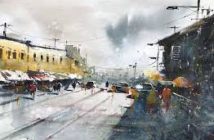
The sense of discovery in remote plein air locations. We leave nothing behind and take only our joy and feelings of privilege with us.
Archived Comments
Enjoy the past comments below for Workshop wonder…
As an artist and workshop instructor, I wince at the phrase “at the feet of a living master.” I have learned more from my workshop participants than I can ever hope to impart. When I was on the other side of the table, one of my best workshops was with Gloria Miller-Allen, because she had the humility to show us her early work. It was awful, and a perfect illustration of what can be accomplished with persistence: she is now a successful and admired artist. I wonder if I would have learned that valuable lesson from someone who thought of himself as a living master. Teaching is more rewarding than I ever imagined it could be, and I agree with your description of “eager-to-learn students…frank crits…and a sense of well-being…” as necessary ingredients for a successful workshop. As the retired segment of the population continues to grow, so will the offerings of learning opportunities; the discerning student will quickly learn to navigate the course catalogs and find the kind of instruction that best suits her needs.
Daniel is an amazing talent ! I met Daniel and Richard Schmid when I was at the 1st American Artist Masters Weekend in 2009. I have been following Daniel’s career on FB and he is going places ! Congrats, Daniel !
Amazing paintings, I thought they were by Richard Schmid.
As a seasoned artist like yourself, I find D Keys quotes to be trite and without significant insight. Sad that you champion him. Other articles you write are great.
Im a very amateur water colourist, but I learn from your letters all the time. Your current one on workshops would be much appreciated if you were to include Haliburton School of the Arts here in Ontario. It runs all summer with week-long or week-end workshops in painting using a variety of modalities which are taught by fine Canadian painters. Friends and I are attending one in July for watercolourists, to be taught by Ross Monk and Maurice Snelgrove, both of whom you have likely heard, or know. Perhaps you could tell your readers about the HSTA which is a part of the program of Fleming College.
Pretty hard to pick and choose workshops up here in the North of Ontario…once paid a guy seventeen dollars (for half hour music lesson) and he ended up showing me how to hold a pic…best money I ever spent…there’s always something to learn if you can get yourself out of the way! – we are a bit isolated up here in Wawa …A.Y. Jackson found his way up here!
It’s amazing what a person can pick up in a relatively short time. Daniel Keys may be using the Schmid method but he has clearly mastered it. I expect great things from this fellow who has approached his art like gong to school and working hard. Who knows what the future will bring for him.
I am going to be in the minority again and this may all sound like sour grapes but here goes and I will make an effort to be sincere. Someone above said “I thought they were by Richard Schmid.” and therein lies the problem. The student has learned all the information but with little substance or personal insight. We already have a Richard Schmid, we don’t need another one. There are a few painters working today that are doing so on the coat tails of others like Mr. Keys. While I admire Mr. Keys work, it lacks the depth and insight of a personal statement when you compare the two artists. I know this view will cause others to contact me, so please do so on this site so others may join in, and don’t contact me personally. The former artist has years of insight and experience that is lacking in the latter artist. It’s also a sad commentary that the student should adhere so closely to his mentor. At other times when this happens, the student show some difference and individual inclinations and it show in the work. This is totally absent in his current work and fits to a “T” the work of Mr. Schmid. While copying is a sincere form of flattery and a good way to learn, an artist needs to have an individual voice. What I see is Mr. Key’s ability to mimic his master while I don’t see individuality hidden within. For some, this may be enough and I don’t want to throw water on Mr. Key’s achievements. To master Mr. Schmid’s technique and be able to do so this well is achievement enough. Also calling him worldly at 26 is premature to say the least. I hope in time he finds the voice that is lacking in this current work. As good as he has become, it’s a clever copy of an original.
Cynthia, give the guy a break–he’s only 26.
Yeah, and probably laughing all the way to the bank!
I enjoyed meeting you recently at Painter’s Lodge on Vancouver Island. What a great weekend, with such talented and inspirational painters to learn from! I was fascinated watching you create your painting on the dock and listening to your presentation. You mention choosing your workshop well…I feel I really did at Painters’, but it was just a hint of the depth of learning I have yet to do with my watercolours. Will try to save my pennies and find an in-depth workshop in the future. Thanks for for sharing your talent and knowledge!
Watching professional painters and hearing casual remarks gives personal insight into process. I find the questions people ask while a painter is working are valuable to me, for I would not be able to come up with those sorts of questions, because, while watching, I just float along with a nullified brain, marveling at it all. Yorkshire, UK
Somewhere in Robert’s writing he says that “nobody ever became a professional boxer by attending prizefights.” Interesting.
As an artist I feel blessed and endowed with the greatest of gifts “creativity”. To share my artistic knowledge is a way to extend the gift to others. Knowledge like books we have read should be passed on. Richard Poussette-Dart said “To teach is to learn” and “if we ever think we know all there is to know about our creativity we are dead as artists.”
The best instructors are those who encourage you to find your own expressive language. Schmid’s paintings are excellent, but his followers that paint just like him need to find their own stlye and artistic language, that is the “REAL” creative process that defines a true artist.
Well, the workshop I attended to that worked best for me was when the instructor kindof let us all go, then walked around… (we were working with a model), stopping here and there… looking at what I had done, he saw where I struggeled with my pose and with a few words and a stroke of charcoal or two he showed me how to percieve the problem better and c l i c k some hidden and long forgotten learning from art school that i had not understood at the time all of a sudden fell into place… opening up for freer works when at home in my studio… still gaining from those 5 days 4 years later…
Rick, I have to agree with you. A good workshop teacher has to be thinking about this too and not try to create little clones of herself. As an instructor, I think a lot about how to teach the techniques and principles without encouraging my students to paint like I do. Every once in a while I am pulled up short and realize I am boxing in a student and have to back off. More often though, I have students leave my class because they want more structure. They actually want a teacher to tell them exactly what and how to paint, step by step, and that is not my way. They way I look at it, creativity is a powerful gift and some people are excited by it and want to use it and others are afraid of it.
Nina – (I like your work- very individual and personal) You hit the nail on the head. My students want to paint like me and I tell them they never will or should even try. They need to look into themselves and speak from who they are and find what it is they want to relay with their art. I only give them the tools to achieve this goal.
Your letter today just helped me make up my mind on an issue I’ve been back-braining for several months. I am primarily a fiber artist – and do ‘paper’ arts for a hobby (mostly altered books). I’ve been considering whether to take formal ‘art’ classes to learn watercolors and maybe ‘real’ drawing/painting for some time. Usually I just putter about with the art media in what I think of as ‘kindergarten’ mode (I never actually attended kindergarten so I tell my ‘artist’ friends that I’m overcompensating in my adult life:). And, of course, I make stuff – if I have no expectations for result, I generally like what I made and it gets used (either in whole or chopped up) in my ‘real’ work. Sometimes I think I should ‘learn the secrets’ of using the media ‘correctly’ by way of being more efficient in my production. Certainly there is something to be said for learning the materials science issues more efficiently than by failure-mode experimentation. :) Still, I think I might be better off just bumbling along as I am now, if your letter covers the issue. Thanks for firming up my thinking! :) linda
I always enjoy reading these letters and comments. This time I do agree somewhat with Rick Rotante and Nina Freeman (and a few others). I can see learning how a master does his work and copying it to learn. Then I want to see that student stretch and go in their own direction. I have been teaching for about 12 or so years. Now I do not do structured classes, but mentoring. I even kind of hate that word, but it describes what I do best. I have also had a student drop from a class because I was not structured enough. I question the students to see what it is they wish to achieve … what direction they want to go with their art before I start pushing them in any direction. I am currently in Denver CO area teaching a plein air workshop. The students see me paint, then they paint. Questions are asked and students get to struggle with answers to their own questions. Sure, I will show them basics and answer those questions, but when it comes to something they need “creatively”, then I stand quietly while they contemplate the direction they need to go. I think struggle, making one’s own mistakes, and occasional nudges from the teacher are important. I do not turn out clones of my work. I have had many tell me they learn more from within themselves when I allow them to talk and muddle a little through the process. I do like Mr. Keys work, but await seeing where he takes his “own” voice!
At 26 Keys has only begun…those of you calling him a clone would probably feel great pride were you at his stage now. Art is always a developing talent, I expect Keys will move ahead to mastery of his own creation. But I expect many just have to find fault to be able to accept his accomplishments.
I guess we are all in awe what a 26 year old artist achieved as a follower. But some of us think that’s all, while others would like to nudge him to move further to develop as a leader. In any case, he did more than great so far!
Carolyn Caldwell pastel workshop was listed on your previous newsletter and I took her workshop, but it was far from what was advertised. She taught beginner color theory instead of what was represented as working with artists to “win contests and get into better galleries”. She told me in email that we would work in plein air in the afternoons, but told another particpant that we would paint exclusively in studio – which we did. I traveled 10 hours to Deer Isle Maine to paint indoors!!!!! On beginner stuff!She refuses to refund money or even apologize for misleading me. I would never recommend taking her workshop since she does not live up to her promises, nor does he make her lessons fun or interesting.
I’m truly sorry that Paula Heiser had such a disappointing experience in my workshop. While I will gladly give a refund if a student attends full time and commits to executing each exercise Paula attended less than half time and resisted my suggestions. The other participants loved the workshop and went on to win awards.


Towards Pendeen Watch Light House original painting, 11 x 14 inches by Michael Richardson, UK |















Curious why you didn’t name your mentor.